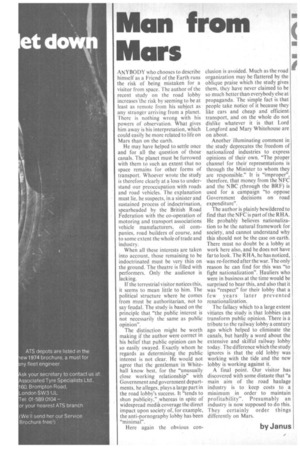Man from Mars
Page 97

If you've noticed an error in this article please click here to report it so we can fix it.
ANYBODY who chooses to describe himself as a Friend of the Earth runs the risk of being mistaken for a visitor from space. The author of the recent study on the road lobby increases 'the risk by seeming to be at least as remote from his subject as any stranger arriving from a planet. There is nothing wrong with his powers of observation. What gives him away is his interpretation, which could easily be more related to life on Mars than on the earth.
He may have helped to settle once and for all the question of those canals. The planet must be furrowed with them to such an extent that no space remains for other forms of transport. Whoever wrote the study is therefore clearly at a loss to understand our preoccupation with roads and road vehicles. The explanation must lie, he suspects, in a sinister and sustained process of indoctrination, spearheaded by the British Road Federation with the co-operation of motoring and transport associations vehicle manufacturers, oil companies, road builders of course, and to some extent the whole of trade and industry.
When all these interests are taken into account, those remaining to be indoctrinated must be very thin on the ground. The theatre is filled with performers. Only the audience is lacking.
If the terrestrial visitor notices this, it seems to mean little to him. The political structure where he comes from must be authoritarian, not to say feudal. The study is based on the principle that "the public interest is not necessarily the same as public opinion".
• The distinction might he worth making if the author were correct in his belief that public opinion can be so easily swayed. Exactly whom he regards as determining the public interest is not clear. He would not agree that the gentleman in Whitehall know best, for the "unusually close working relationship" with Government and government departments, he alleges, plays a large part in the road lobby's success. It "tends to shun publicity," whereas in spite of widespread mediii coverage the direct impact upon society of, for example, the anti-pornography lobby has been "minimal".
Here again the obvious con elusion is avoided. Much as the road organization may be flattered by the oblique praise which the study gives them, they have never claimed to be so much better than everybody else at propaganda. The simple fact is that people take notice of it because they like cars and cheap and efficient. transport, and on the whole do not dislike whatever it is that Lord Longford and Mary Whitehouse are on about.
Another illuminating comment in the study deprecates the freedom of nationalized industries to express opinions of their own. "The proper channel for their representations is through the Minister to whom they are responsible." It is "improper", therefore, that money from the NFC and the NBC (through the BRF) is used for a campaign "to oppose Government decisions on road expenditure".
The author is plainly bewildered to find that the NFC is part of the RHA. He probably believes nationalization to be the natural framework for society, and cannot understand why this should not be the case on earth. There must no doubt be a lobby at work here also, and he does not have far to look. The RHA, he has noticed, was re-formed after the war. The only reason he can find for this was "to fight nationalization". Hauliers who were in business at the time would be surprised to hear this, and also that it was "respect" for their lobby that a few years later prevented renationalization, The fallacy which to a large extent vitiates the study is that lobbies can transform public opinion. There is a tribute to the railway lobby a century ago which helped to eliminate the canals, but hardly a word about the extensive and skilful railway lobby today. The difference which the study ignores is that the old lobby was working with the tide and the new lobby is working against it.
A final point. Our visitor has discovered with some distaste that "a main aim of the road haulage industry is to keep costs to a minimum in order to maintain profitability". Presumably an industry is now supposed to do this. They certainly order things differently on Mars.
by Janus




































































































































































































